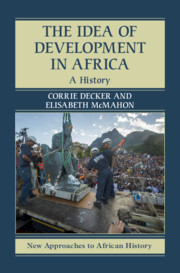Book contents
- The Idea of Development in Africa
- New Approaches to African History
- The Idea of Development in Africa
- Copyright page
- Contents
- Figures
- Tables
- Maps
- Boxes
- Acknowledgments
- Maps
- Introduction
- Part I Origins of the Development Episteme
- Chapter 1 From Progress to Development
- Chapter 2 Knowledge and the Development Episteme
- Chapter 3 Eugenics and Racism in the Development Episteme
- Chapter 4 Decolonizing the Idea of Development
- Part II Implementation of the Development Episteme
- Part III “Problems” in the Development Episteme
- Epilogue
- Bibliography
- Index
- References
Chapter 2 - Knowledge and the Development Episteme
from Part I - Origins of the Development Episteme
Published online by Cambridge University Press: 16 October 2020
- The Idea of Development in Africa
- New Approaches to African History
- The Idea of Development in Africa
- Copyright page
- Contents
- Figures
- Tables
- Maps
- Boxes
- Acknowledgments
- Maps
- Introduction
- Part I Origins of the Development Episteme
- Chapter 1 From Progress to Development
- Chapter 2 Knowledge and the Development Episteme
- Chapter 3 Eugenics and Racism in the Development Episteme
- Chapter 4 Decolonizing the Idea of Development
- Part II Implementation of the Development Episteme
- Part III “Problems” in the Development Episteme
- Epilogue
- Bibliography
- Index
- References
Summary
Nineteenth-century Europeans developed scientific methodologies that generated new knowledge about Africa through Eurocentric ideas about progress. These ideas became the foundation for the development episteme. The development episteme emerged out of both these scientific endeavors and the missionary-imperialist project to disseminate European Christianity, commerce, and “civilization” to Africans. Knowledge explorers, cartographers, medical doctors, biologists, economists, ethnologists, and other scientists produced about Africa facilitated colonization by claiming mastery over the continent’s environment and people. Europeans drew on this scientific information to assert their technological expertise and moral right to “civilize” Africans. European scholars suggested their expertise was needed because they knew Africans best. Yet the development episteme was formulated in dialogue with Africans whose own knowledge and interests often determined which development efforts would succeed and which would fail. Many Africans working for Europeans were educated in Western, most often missionary schools. As such, African assistants were adept at filtering information through a Western lens. This filter transformed African knowledge into European “facts.” More recently scholars of the global north have introduced forms of knowledge about Africa that do not perpetuate the notion of Western superiority, but that still rely on some of the assumptions built into nineteenth-century European epistemologies.
Keywords
- Type
- Chapter
- Information
- The Idea of Development in AfricaA History, pp. 39 - 57Publisher: Cambridge University PressPrint publication year: 2020

